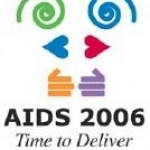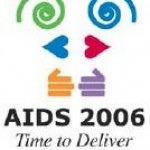August 17, 2006 (AIDSmeds)—Preliminary results from an ongoing clinical trial of MK-0518, Merck’s experimental integrase inhibitor, suggest that it has comparable anti-HIV activity to Sustiva®(efavirenz) after 24 weeks of treatment. The new data were reportedtoday at the International AIDS Conference (IAC) in Toronto by MartinMarkowitz, MD, of the Aaron Diamond AIDS Research Center in New York,and were accompanied by an announcement from Merck that an expandedaccess program for the drug will be started within the next few months.
MK-0518 is one of two integrase inhibitors currently in phase II clinical trials. The other agent is Gilead Sciences’ GS-9137.
Integrase inhibitors block a middle step in HIV’s lifecycle. After HIV has entered a CD4 celland its RNA has been reverse transcribed to viral DNA, it must then beintegrated into the CD4 cell’s DNA. The HIV DNA can then hijack theCD4 cell, turning it into a viral factory. MK-0518 blocks the viralDNA integration, hence its classification as an integrase inhibitor.
Thenew data comes from a two-part clinical trial of MK-0518. The firstpart of the study, reported in November 2005, evaluated different dosesof MK-0518 given as monotherapy (without other HIV drugs): 100mg,200mg, 400mg, or 600mg taken twice a day.
Dr.Markowitz’s presentation focused on the research conducted in thesecond part of the study. It enrolled 198 HIV-positive people startingtreatment for the first time – and included 30 participants enrolled inpart one of the study – to receive either MK-0518 at one of the sixdoses explored in part one of the study or Sustiva. All patients inthe study also received Viread® (tenofovir) and Epivir® (lamivudine).
The study will maintain patients on treatment for 48 weeks.
Uponentering the study, average viral loads in the various treatment groupsranged from approximately 43,000 to 68,000. After 24 weeks of therapy,85% to 95% of patients taking the MK-0518 regimen saw their viral loadsreduced to less than 50, regardless of which dosing group they were in.In the Sustiva group, approximately 92% of patients experienced viralload reductions to less than 50. The differences between the variousMK-0518 dosing groups and the Sustiva group were not statisticallysignificant, meaning that the variations could have been due tochance.
CD4 cell counts, ranging from 271 to 314 atthe start of the study, increased in all patients after 24 weeks ortreatment. Among patients in the MK-0518 groups, CD4 counts increasedby 139 to 175 cells. In the Sustiva group, CD4 counts increased by 112cells. As with the viral load results, these differences were notstatistically significant.
Dr. Markowitz reported that, thus far, treatment with MK-0518 or Sustiva seems to be well tolerated. Nausea,dizziness, and headache appear to be the most frequently reported sideeffects. The only possible treatment-related toxicity of concern was apatient in the 600mg MK-0518 group who discontinued therapy due tosignificantly increased liver enzymes.
Expanded Access Program Announced
Theexpanded access program (EAP) with MK-0518, announced today by Merck,will essentially be an open-label study of the drug. It will continueuntil approximately three months after MK-0518 has been approved by theU.S. Food and Drug Administration and made available through pharmacies.
Tobe eligible to participate in the EAP, which will essentially providethe drug, free of charge, to patients in need, candidates must beHIV-positive, at least 16 years of age, have limited or no treatmentoptions available to them due to resistance or intolerance to multipleHIV regimens, are not achieving adequate viral load reductions on acurrent regimen, and are at risk of serious disease progression.
Patientsin the EAP will receive open-label MK-0518 400mg twice daily. It willneed to be combined with a drug regimen selected by patients and theirhealth care providers (Merck will not pay for the medications beingcombined with MK-0518 in the EAP). The program will be managed by aclinical research organization (CRO). The CRO will collect all casereport information including serious side effects.
Accordingto Merck, the EAP will be started in the United States within the nextfew months; no specific date was announced. Once the EAP is open toenrollment, information will be posted immediately as an AIDSmeds.comnews story and will be listed in the MK-0518 lesson on this site.
IAC: Data, Access for Integrase Inhibitor





Comments
Comments